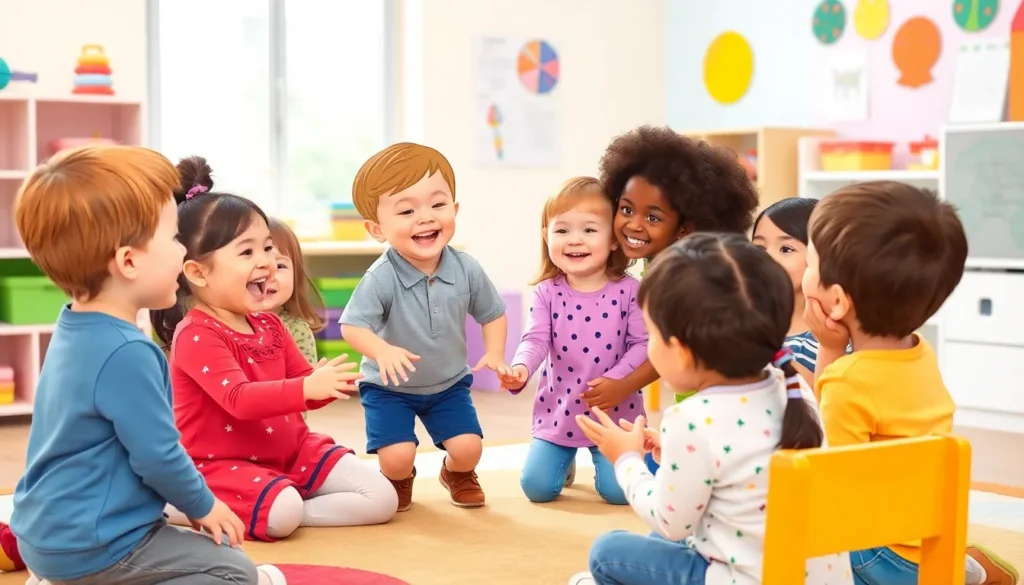Table of Contents
ToggleIn the whimsical world of preschool, social skills are the secret sauce that makes friendships bloom. While kids are busy mastering the art of sharing crayons and dodging the occasional sticky-fingered snack thief, it’s crucial to sprinkle in some fun activities that teach them how to navigate social waters. After all, nobody wants a toddler who thinks “sharing” means holding onto a toy for dear life!
Importance Of Social Skills For Preschoolers
Social skills form the foundation of healthy communication and relationships for preschoolers. Understanding these skills influences their ability to interact with peers effectively. They learn to express themselves, recognize emotions in others, and respond accurately. Connecting with others through play nurtures emotional intelligence.
Sharing and cooperating during activities fosters teamwork. Engaging in group exercises teaches children to resolve conflicts and appreciate different perspectives. Children who develop social skills often build friendships that enhance their self-esteem and happiness. Positive interactions also promote a sense of belonging in social settings.
Practicing these skills early prepares children for future challenges. Effective communication eases transitions to kindergarten and beyond, where social dynamics become more complex. Learning to connect well with others assists in academic success. Children with strong social abilities typically exhibit better concentration and participation in classroom activities.
Encouraging interaction in structured and unstructured settings helps reinforce these skills. Activities like role-playing or group games provide opportunities to practice. They serve as platforms for kids to explore social roles, share ideas, and understand the impact of their actions on others.
Exposure to social scenarios boosts confidence in young learners. Supporting preschoolers in navigating friendships promotes resilience. Building social skills early ensures children are equipped for lifelong connections. Consistent practice enables them to thrive in diverse environments as they grow.
Fun Social Skills Activities

Engaging preschoolers in social skills activities can improve their interactions and emotional intelligence. Various activities foster sharing, cooperation, and communication.
Group Games
Group games enhance teamwork and collaboration among preschoolers. Simple activities like “Duck, Duck, Goose” encourage children to take turns and develop patience. “Simon Says” promotes listening and following directions while fostering a sense of fun. Additionally, cooperative games like “The Human Knot” require problem-solving skills, allowing children to work together towards a common goal. These games teach the importance of empathy and understanding different viewpoints, paving the way for lasting friendships.
Interactive Storytelling
Interactive storytelling offers a creative way to develop social skills. Children participate by acting out characters or providing ideas. This activity fosters imagination while encouraging verbal communication. For example, using puppets or props enhances engagement and helps children express emotions. This type of storytelling promotes discussion about feelings and scenarios, nurturing emotional awareness. As preschoolers share their thoughts, they learn active listening and reinforce respectful interactions.
Role-Playing Activities
Role-playing activities provide opportunities to practice social scenarios in a safe environment. Children can take turns being characters in familiar situations, such as visiting a doctor or shopping at a store. These activities help preschoolers understand and navigate social norms. When they role-play, kids practice problem-solving and conflict resolution strategies. Incorporating discussions about actions and feelings further reinforces understanding of empathy. These activities create a foundation for effective communication and stronger peer relationships.
Tips For Encouraging Social Skills Development
Encouraging social skills development in preschoolers involves utilizing effective strategies that promote interaction and understanding. Implementing these tips helps cultivate essential skills children need for successful relationships.
Positive Reinforcement
Using positive reinforcement effectively boosts children’s social skills. Praising children for sharing toys or cooperating in group activities highlights their good behavior. Reinforcement can take many forms, such as verbal praise, high-fives, or stickers, depending on what motivates the child. Rewarding efforts encourages them to repeat desired behaviors. When children observe their peers receiving praise, they often mimic those actions, fostering an environment of cooperation and kindness. Gradually, this reinforcement nurtures self-confidence, empowering them to engage more fully in group interactions.
Creating a Safe Environment
A safe environment is crucial for social skills development. Establishing a space where preschoolers feel secure enables them to express themselves freely. Teachers and caregivers play a vital role in monitoring interactions, ensuring that conflict resolution strategies are in place. Being attentive to children’s emotions enhances their ability to navigate social nuances. The inclusion of diverse toys and activities invites participation and collaboration among peers. Offering opportunities for children to speak and share their thoughts fosters communication skills. When children feel safe, they are more likely to explore, connect, and build lasting relationships.
How To Assess Social Skills Progress
Assessing social skills progress in preschoolers involves observing behaviors and interactions. One effective method includes tracking participation in group activities, as engagement levels indicate comfort and confidence. Observers should note how children respond to shared experiences, particularly during structured games or cooperative tasks.
Utilizing checklists can streamline the assessment process. A checklist can include criteria such as sharing, taking turns, and responding to peers. Regular documentation helps identify trends and areas needing improvement.
Evaluating emotional responses also provides insight into social skills. Children who can articulate their feelings during play illustrate a deeper understanding of emotional intelligence. Recognizing emotions in others enhances empathy and promotes stronger relationships.
Additionally, peer interactions are crucial for assessment. Observing how preschoolers navigate friendships reveals social dynamics at play. Instances like resolving conflicts or negotiating game rules highlight their developing abilities to communicate effectively.
Feedback from caregivers and teachers contributes valuable perspectives. Conversations can clarify specific situations where preschoolers displayed both growth and challenges. Discussions about children’s interactions with peers offer comprehensive insight into their social skills development.
Finally, using informal assessments can be beneficial. Engaging children in role-playing scenarios allows for real-time evaluation of their responses to social challenges. Through these activities, caregivers can assess how well children utilize learned skills in practical settings.
Fostering social skills in preschoolers is vital for their emotional and social development. Engaging in fun activities not only helps them learn to share and cooperate but also lays the groundwork for healthy communication and relationships. By participating in structured and unstructured play, children can explore their emotions and develop empathy towards others.
Encouraging positive interactions through games and role-playing nurtures friendships that boost self-esteem and a sense of belonging. Caregivers play a crucial role in creating a supportive environment where children can practice these skills. Observing and assessing their progress allows for targeted support, ensuring they thrive in social settings. Ultimately, the early development of social skills equips preschoolers with the tools they need for lifelong success and meaningful connections.







